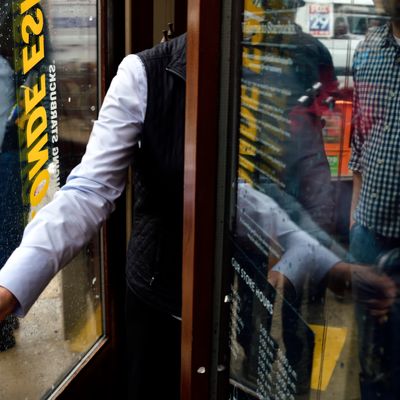
There is a well-known stereotype of a particular kind of coffee-shop patron — an aspiring screenwriter or freelancer, scrupulously cobbling together their pitches or book proposals, courtesy of their favorite local haunt’s free Wi-Fi, electrical outlets, and comfortable furniture, paying for their mobile home office with just a $2 cup of bottomless coffee. This patron, of course, is usually white. The trope has been both parodied and celebrated, and it’s easy to find lists ranking coffee places by how easily they can be transformed into work spaces. Since this lifehack only works by shifting costs from the patron to the coffee-shop owner, some coffee shops have responded by either eliminating Wi-Fi services or furniture — but I’ve never heard of an earnest novelist being carted away in handcuffs for spending several hours after their last order writing character sketches.
Last Thursday, however, two young black men named Rashon Nelson and Donte Robinson were arrested and forcibly removed by police from a Starbucks café in the Rittenhouse Square neighborhood of Philadelphia while waiting to meet a (white) colleague for coffee.
According to reports, the police were summoned by the on-site manager, who denied either one or both men entry to the bathroom. There are a few conflicting details; whether or not the manager informed them that they had to leave before calling the police has been disputed by witnesses. During a live interview for Good Morning America, Nelson and Robinson said that they arrived at 4:35 p.m. for a 4:45 p.m. meeting and informed the staff. The police were called at 4:37, just two minutes later. Regardless, the core facts remain the same: two young black men were following the common practice of waiting for the rest of the party to arrive before ordering, were deemed unwelcome by the on-site staff, and law enforcement was dispatched to dispose of these intruders to the sacrosanct environs of an international café chain.
In response to the national outrage spawned by a video documenting the interaction, Starbucks executives put out a series of statements expressing their dismay at the incident and vowing to work to prevent a recurrence of these events, explaining that their “store manager never intended for these men to be arrested and this should never have escalated as it did.” While that may certainly be true, calling the police — especially calling them to deal with black people — is inherently an escalation, and one that sharply increases the possibility of violence. In this case, a 911 call implying that the two men had refused to leave prompted seven officers to arrest them, remove them from the shop, and detain them for eight hours without charging them with anything. The crux of the pushback has been around the racial dynamics of the encounter: Several of the nonblack patrons at the Starbucks location in question reported that they had been there for a long time, without purchasing anything and without recrimination.
There is an unspoken code of behavior in coffee shops — a certain level of perceived gentility expected for the privilege of loitering indefinitely. This is an impossible aura for black people to project — their mere presence is perceived as a threat. In a 2017 report conducted by the ACLU on stop and frisk in Philadelphia, statistics in the Rittenhouse Square neighborhood where this Starbucks is located showed that 68 percent of stops by the PPD were conducted on black residents, despite having a neighborhood black population of merely 3 percent. This is a phenomenon referred to as “out-of-place policing”, which not only ties blackness to criminality, but views the presence of black people in white neighborhoods as suspicious
This is the problem Starbucks executives have publicly committed to addressing with a franchise-wide day of training on “unconscious bias”on May 29, with guidance from partners such as former Attorney General Eric Holder, Sherrilyn Ifill of the NAACP Legal Defense and Education Fund, and Jonathan Greenblatt of the Anti-Defamation League. The swift decision is commendable, but the circumstances around the incident point to a weightier problem than mere “bias”.
There is a certain toothlessness in the phrase “unconscious bias,” however well-intentioned, as a description for racism. It minimizes it by transforming the systems and social conditions that oppress the marginalized into a mere accident of psychology. To allow a white patron to idle indefinitely while simultaneously calling the police to remove black patrons by force in two minutes is more than mere unwitting partiality. It is an active decision to view a black presence in white spaces as something that needs to be explained, validated, and adjudicated — which is to say that it is just good ol’ fashioned racism. Marking it as “unconscious” is a way of releasing the person from responsibility for their own actions. A training predicated upon this false premise is not likely to be effective.
It remains to be seen whether the measures undertaken by Starbucks executives are meant to address the actual treatment of black customers, or whether they are simply meant to mollify the backlash. And even if executed rigorously, not only is it an open question whether unconscious-bias training actually works, it’s unclear how we should even measure its impact. Nevertheless, it’s important for us to look at the broader context: We treat the presence of black people, especially in places in which there aren’t many of them, as inherently suspicious, and truly coming to terms with the society-wide implications of this behavior will take more than a one-day corporate workshop.





























